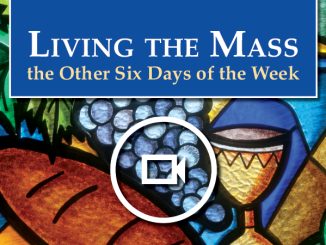
Many years ago I was challenged by a high school student who accused me of telling her what to believe. We were discussing Paul’s admonition to the Corinthians regarding receiving the Eucharist unworthily (1 Corinthians 11) and whether or not Catholics must believe in the Real Presence of Jesus Christ in Holy Communion in order to “receive worthily.” The idea that she must believe this to be true in order to receive the Eucharist bothered her so much that she stopped receiving. I do not know if she ever resolved this conflict, or if she ever returned to the sacrament.
The situation made me uncomfortable, and I still feel a tremendous amount of guilt thinking that I may have turned someone away from this sacrament of love. On the other hand, I felt obligated to “hold fast to what has been handed on to me.” I felt a duty as a catechist and youth minister to stand firm in upholding the teachings of the Church, even though doing so caused another to reject those teachings. From my perspective, I was not telling the student what to believe, only expressing what the Church believes and teaches. Still, I felt I had not done a good enough job of sharing with this young seeker the heart of what Jesus intended. I had failed to lead her to an experience of Jesus Christ’s Real Presence.
Now that we have celebrated the Resurrection and are enjoying the Fruits of the Spirit during the Easter season, many parishes are focusing their energy on finalizing plans for the celebration of First Eucharist. We have spent weeks working with families and children, trying to share the immense love Christ pours out through his Body and Blood, which comes to us in the form of bread and wine. The Scriptures are full of powerful stories that support our Catholic belief in the Real Presence and how the first Christians understood it. Our catechetical resources provide ample opportunities to engage parents and children with all the details. We may hold special retreat days to pull it all together and make certain they understand.
But are we doing a good enough job of helping them “receive worthily”? And what does that even mean? For some, unquestioning consent to all that comes to us from the ecclesial authority is necessary. But even Thomas doubted. And are our students even capable of unquestioning consent? Are their parents? What are we truly expecting to accomplish as we lead this next group of First Communicant families to the Lord’s Supper?
In a book review in the National Catholic Reporter, Donald Cozzens writes, “Without denigrating the place of doctrine . . . in our religious and spiritual journeys, we have come to see the heart of Christianity with fresh eyes. Christianity, contemporary spiritual writers note, is not so much a law to be obeyed but a presence to be grasped.”
Perhaps this is the point we really need to understand: Eucharist is not so much a law to be obeyed but a presence to be grasped. What can we do to lead others to an experience of the Real Presence?




Our Parish implemented an expanded Eucharistic Adoration (Monday through Friday, 9:30 AM – 7:00 PM) at the beginning of Lent and is continuing it, as the response/participation has been very good. This allows Catechists to take their classes up for Adoration, even for a brief time. Our 6th graders study the Salvation Story in the Bible, and I have been taking our class for 5 minutes of Adoration each week. For many, I think this was their first experience with Eucharistic Adoration.
We were beginning our study in Scripture of Jesus’ public ministry when the expanded Adoration began, and then we studied the Paschal Mystery in the weeks leading up to Holy Week/Easter. The timing was perfect (God is so good!) – reading God’s Word about “all are invited to the Lord’s table”, the “bread of life” discourse, the Last Supper, and the “road to Emmaus” story helped the students become more aware of Jesus’ presence in the Eucharist, and how He dwells in us when we receive Him.
I have noticed real spiritual growth in the youth from these Adoration visits. At first they were a bit restless and unfocused with the silence; now most of them appear to be more deeply engaged in prayer and “encounter” with Jesus. I make sure to update the parents through email about our visits and experiences; I encourage the families to make even short visits to Eucharistic Adoration.
“The Eucharist is the Sacrament of Love. It signifies Love, it produces Love.” – St. Thomas Aquinas.
Thanks for the beautiful article, Kathy!